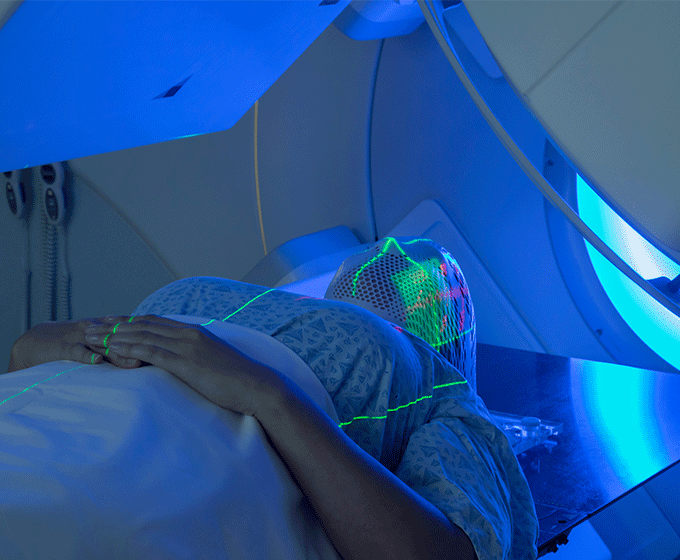
FEBRUARY 24, 2022 — Arkajyoti Roy, assistant professor in the Department of Management Science and Statistics in the UTSA Carlos Alvarez College of Business is leading a first-of-its kind study working with colleagues at UT Health San Antonio to explore how artificial intelligence (AI) can be used to track cancer tumor shrinkage in patients who receive radiotherapy.
Many studies have shown there is significant tumor shrinkage during radiotherapy. When patients receive radiation treatments, however, doctors typically ignore tumor volume changes, and they deliver the same radiation dose repeatedly during a five-to-seven-week treatment.
The team’s study, titled “Managing tumor changes during radiotherapy using a deep learning model,” has been published in the latest edition of the Medical Physics journal.
The team’s research revealed a better option. It demonstrated that it is possible to accurately predict tumor shrinkage and include those tumor changes in radiation treatment plans. This approach can reduce toxicity to surrounding organs and healthy tissue and ultimately improving the patient’s quality of life.
“With improvements in imaging technologies, we are able to gather higher resolution patient data during cancer radiation treatments. Combined with novel AI algorithms, we developed predictive and prescriptive models that can predict a patient’s anatomy in the future, and more importantly, design adaptive radiotherapy plans in anticipation of the changes,” said Roy.
A significant concern for experts is tracking the tumor shrinkage in lungs during radiotherapy. Using the weekly scans of 16 lung cases, the researchers used AI algorithms to identify the changes in the characteristics in the patient’s anatomy that allowed for the prediction of future tumor shape and size on new patients.
With these AI predictions in hand, the researchers optimized future treatment plans by maximizing the radiation dose coverage in the predicted tumors while minimizing radiation exposure to surrounding organs and healthy tissue.
The results showed that using the deep learning model allowed doctors to significantly reduce the therapy dose and still maintain tumor coverage—a great improvement to current clinical practice.
The research team is now developing an improved AI-based adaptive model to better predict changes in the tumor shape and size to offer medical providers with valuable historical data that will further benefit treatment protocols for patients.
“Our goal is to merge both worlds, the AI predictions and optimization in one model to improve the radiation treatments implemented in the clinic,” Roy concluded.
UTSA is an urban serving Tier One research university that is dedicated to advancing world-class research programs that are addressing society’s greatest challenges. The institution is driving San Antonio’s knowledge economy, living out the notion that great universities need great cities and great cities need great universities. UTSA is building its academic and research capacity in areas that are intentionally aligned with the city’s economic strengths, including health, cybersecurity, fundamental futures and social-economic transformation.
UTSA Today is produced by University Communications and Marketing, the official news source of The University of Texas at San Antonio. Send your feedback to news@utsa.edu. Keep up-to-date on UTSA news by visiting UTSA Today. Connect with UTSA online at Facebook, Twitter, Youtube and Instagram.
Move In To COLFA is strongly recommended for new students in COLFA. It gives you the chance to learn about the Student Success Center, campus resources and meet new friends!
Academic Classroom: Lecture Hall (MH 2.01.10,) McKinney Humanities BldgWe invite you to join us for Birds Up! Downtown, an exciting welcome back event designed to connect students with the different departments at the Downtown Campus. Students will have the opportunity to learn about some of the departments on campus, gain access to different resources, and collect some giveaways!
Bill Miller PlazaJoin us for an intimate evening of cocktails, conversation, and culinary inspiration with Pati Jinich, Emmy-nominated chef and James Beard Award-winning author. Enjoy light bites and signature drinks in the warm, modern setting of Mezquite as Pati connects with guests over her passion for Mexican cuisine and storytelling.
Mezquite Restaurant in Pullman Market, 221 Newell Ave., San Antonio 78215From inspired courses to thoughtful pairings and a rich sense of community, the Ven a Comer Signature Dinner is a night of shared meals, shared stories, and unforgettable flavor.
Stable Hall (Pear Brewery), 307 Pearl Pkwy, San Antonio 78215Come and celebrate this year's homecoming at the Downtown Campus with food, games, giveaways, music, and more. We look forward to seeing your Roadrunner Spirit!
Bill Miller PlazaThe University of Texas at San Antonio is dedicated to the advancement of knowledge through research and discovery, teaching and learning, community engagement and public service. As an institution of access and excellence, UTSA embraces multicultural traditions and serves as a center for intellectual and creative resources as well as a catalyst for socioeconomic development and the commercialization of intellectual property - for Texas, the nation and the world.
To be a premier public research university, providing access to educational excellence and preparing citizen leaders for the global environment.
We encourage an environment of dialogue and discovery, where integrity, excellence, respect, collaboration and innovation are fostered.